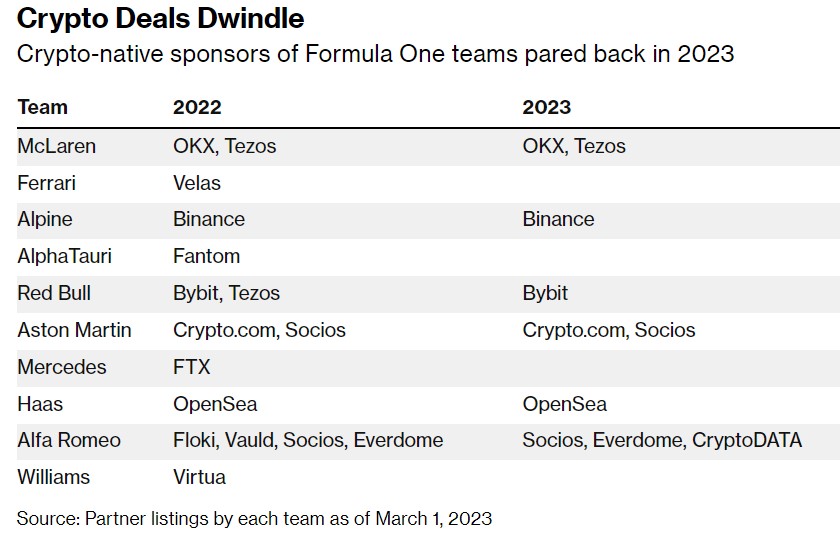
I hadn’t really noticed the rise and rise of crypto firms sponsoring sport until recently. There are quite a number from Bedford to Crawley to Watford. Then there were the Super Bowl ads, such as that wonderful one from FTX last year.
A year later, FTX has disappeared, as has many of its counterparts and dependents. And now, as a result, I have noticed the fall and fall of crypto firms sponsoring sport.
One of the most notable areas of change in this space is in Formula 1 (F1) racing. Coin Telegraph picked up on this story the other day, with the news that Ferrari split with Velas over NFTs last week. The deal was worth $30 million a year and Ferrari, after ending contracts with Velas and another tech firm, are set to lose $55 million this year.
For obvious reasons Mercedes also faced a loss of $15 million after suspending its partnership with FTX as the crypto exchange filed for Chapter 11 bankruptcy last November. Alfa Romeo’s new partner roster indicated its multiyear deal with troubled crypto lender Vauld and another tie-up with meme token Floki are over this year. Red Bull suffered the same fate when the Tezos Foundation decided not to renew its agreement. And it’s not just crypto. Williams Racing ended a deal with metaverse platform Virtua and AlphaTauri.
In fact, in 2022, all of the F1 teams had at least one crypto sponsor but that figure is now down to 3 in 5 teams and looks likely to fall further. Nevertheless, some crypto players have chosen to stick it out in F1, including Binance, Crypto.com, OpenSea and fan-token issuer Socios, as shown in the chart below:
Source: Bloomberg
It is obviously clear that crypto is suffering a harsh winter, as is everything in tech and fintech. After all just look at Signature Bank, another bank failure last week in America due to the collapse of Sam Bankman-Fried's FTX platform.
But what about that metaverse deal?
I found it interesting that The Street claims that Mark Zuckerberg has just quietly told the world that the metaverse is dead, as has Disney. What? A company renamed as Meta says the metaverse is dead? You would think this would have hit the headlines big time. It didn’t. Instead, Meta has quietly pivoted away from the metaverse after losing almost $24 billion in the past two years on the speculative project, to focus on artificial intelligence (AI) instead.
But then, to put those losses in context, the Zuck told The New York Times Dealbook conference last November that only one in five of the investment dollars had been invested in the metaverse.
“About 80% of our investments - a little more -- go towards the core business, what we call our family of apps, so that's Facebook, Instagram, WhatsApp, Messenger, and the ads business associated with that. Then a little less than 20% of our investment goes towards Reality Labs.”
I guess now it will be more like 50 cents or less.
Between these various issues – the downside of Big Tech, the layoffs in FinTech, the crypto winter and the death of the metaverse – we are obviously in hard times in tech. Here’s to when the good times roll (it won’t be long).
Postnote:
Building on my blog about Silicon Valley Bank's collapse, along with Signature Bank, is this another nail in crypto's coffin?
Chris M Skinner
Chris Skinner is best known as an independent commentator on the financial markets through his blog, TheFinanser.com, as author of the bestselling book Digital Bank, and Chair of the European networking forum the Financial Services Club. He has been voted one of the most influential people in banking by The Financial Brand (as well as one of the best blogs), a FinTech Titan (Next Bank), one of the Fintech Leaders you need to follow (City AM, Deluxe and Jax Finance), as well as one of the Top 40 most influential people in financial technology by the Wall Street Journal's Financial News. To learn more click here...


